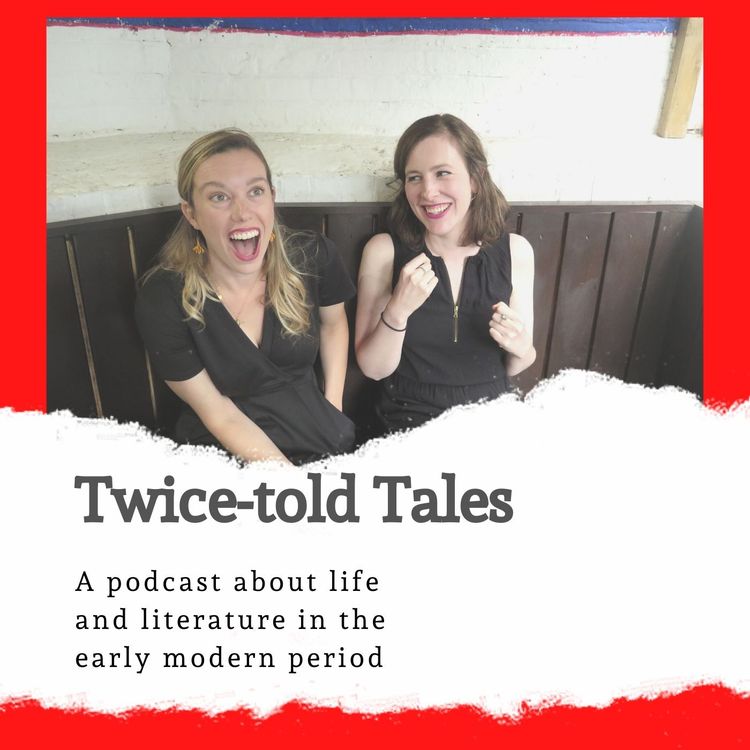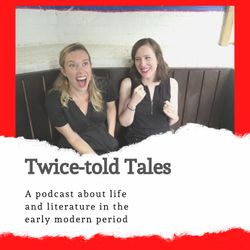Share

Twice-told Tales
2. The Good Life: Relationships
In this episode Leah and Emma discuss the role of relationships (romantic and otherwise) to maintaining health, wellbeing and happiness in early modern Europe. We talk about compatibility, chastity, divorce, widowhood, masturbation, sex and sexuality in the period in literature, conduct texts and personal writings. This week's examples are a short story by Marguerite de Navarre, princess of France, brother of King François I, and author of some of the most celebrated literary works of her time; and some letters from a jilted lover, Thomas Green, from seventeenth-century Manchester found by Leah in the Lancashire Archives.
Sources
Thomas Green to Jane Robinson, 1657, Lancashire Record Office, Preston, DDHK/9/8/4
Marguerite de Navarre, Heptaméron (1558), nouvelle 67
More episodes
View all episodes

5. The Good Life: Ageing
38:19|Do the possibilities for a good life change as you get older, and is a long life desirable? We talk about ageing, health advice for the elderly, life expectancy, families, and the stages of life in early modern Europe. Was it possible to live a good life when old, and if so, good in what sense? This episode's examples are a ballad about an old man neglected by his son and daughter in law, and a brief reflection by the essayist Michel de Montaigne on the Bible verse, ‘To every thing there is a season’ (Ecclesiastes 3, 1-8). Sources mentioned Merlin Sheldrake, Entangled Life: How Fungi Make our Worlds, Change our Minds, and Shape our Futures (London: Random House, 2020)(see the review in the London Review of Books from May 2021: Francis Gooding, ‘From its Myriad Tips’) Peter Godfrey-Smith, Other Minds: The Octopus, The Sea, and the Deep Origins of Consciousness (London: Collins, 2016) Laurence Brockliss and Colin Jones, The Medical World of Early Modern France (Oxford: Clarendon, 1997) Sarah Bakewell, How to Live: A Life of Montaigne in One Question and Twenty Attempts at an Answer (London: Chatto and Windus, 2010) ‘The Old Man’s Complaint Against His Wretched Son who to Advance his Marriage did Undo Himself’ (1658-64). Montaigne, ‘All things have their season’, in Complete Works, tr. by Donald Frame (London: Everyman, 2003)See here for the chapter in French: https://artflsrv03.uchicago.edu/philologic4/montessaisvilley/navigate/1/4/29/ Contact us on twitter: @leahastbury and @eclaussen
4. The Good Life: Religion
41:30|In this episode we discuss the role of faith in early modern Europe and what it menat to have a 'good' soul. We talk about the Reformation, worship, illness, suffering, martyrdom, Providence, and stoic principles. Our examples include a spiritual diary by Yorkshire gentlewoman Alice Thornton and fragments of the French philosopher and mathematician Blaise Pascal's musings on religion. Works/sources mentionedFiona Mozley, Hot Stew.Alice Thornton, My First Booke of My Life, Raymond Anselment (ed) (University of Nebraska Press: 2014). The Witch (2015). Blaise Pascal, 'Pensées', Fragment 168, 'divertissement' (Ferreyrolles and Sellier edition).Sleeping Well in the Early Modern World Project at the University of ManchesterIf you want to buy Emma's book its available here!
3. The Good Life: Learning
39:24|What does reading, learning and contemplating have to do with living a good life? We talk about fortune telling, manifesting, humanism, philosophy, devotion, debate and different kinds of knowledge in early modern Europe. Was it better to be a scholar or lead a more active, practical life? This episode's examples are an English treatise in defence of women's education that encourages women to equip themselves with suitable knowledge to be useful to their husbands and children and a letter by an Italian philosopher about the joy of convivial academic discussion. Sources mentioned Bathsua Makin, An Essay To Revive the Antient Education of Gentlewomen, in Religion, Manners, Arts & Tongues. With An Answer to the Objections against this Way of Education (London: 1673). Elizabeth Jocelin, The Mothers Legacie, To her unborne Childe (London: 1624). Gervase Markham, The English house-vvife Containing the inward and outward vertues which ought to be in a compleate woman (London: 1631). Oscar Wilde, The Picture of Dorian Gray (1890). Anthony Grafton and Lisa Jardine, From Humanism to the Humanities: Education and the Liberal Arts in Fifteenth and Sixteenth-Century Europe (London: 1986). Marsilio Ficino, 'Letter to Bernardo Bembo on the Convivium'.
1. 1. The Good Life: Bodies
46:36||Season 1, Ep. 1This episode is about the relationship between living well and the body in early modern Europe. Was it achievable to live well or did the body and poor health always get in the way for early modern people? This week's sources are Thomas Elyot's medical regimen, intended to advise on protection against the plague and other illnesses, and Lyon poet Louise Labé's sonnets, in which she negotiates the relationship between body and soul in the search for a good, or better, life.Works and websites referenced:Eleanor Morgan, 'Pandemic Periods: Why Women's Periods Have Gone Haywire in Lockdown'Louise Labé, Oeuvres (1555) -- especially Sonnet VIIThomas Elyot, Castell of Helth (1536)Early Modern Recipes Online Collective We also briefly touch on the evolution of watermelons. Find out more here.This podcast was supported by research grants from the Wellcome Trust (205359/Z/16/Z) and the British Academy (PF19\100080).Thank you to our editor, Fiona Symon.